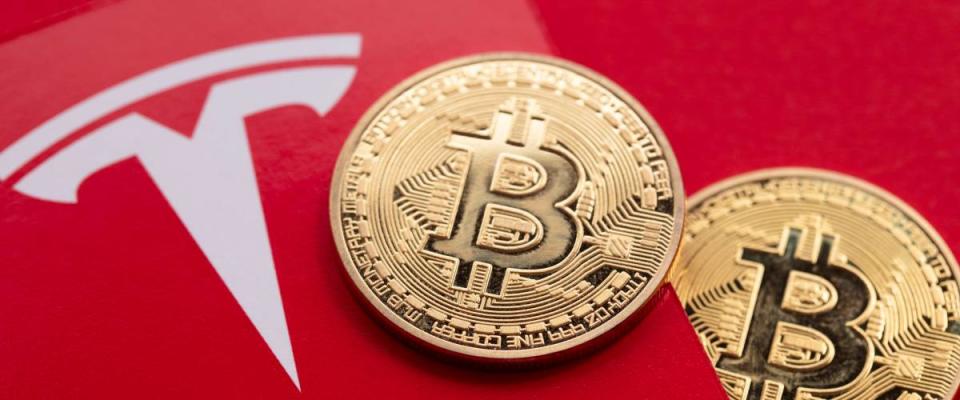Here are 5 ways to profit from the crypto crash without buying volatile coins

Whenever cryptocurrencies like Bitcoin or Ether tank, the thought of buying the dip and riding crypto to its next dizzying peak can be awfully seductive.
But prior to last week’s crash, which saw the price of Bitcoin shed about $8,000 between Sept. 7 and Sept. 10, the world’s most famous cryptocurrency has experienced multiple events where it has lost at least 30% of its value in a matter of weeks.
That kind of volatility isn’t for everybody.
Luckily, there are ways to capitalize on crypto’s current bounce without purchasing any actual cryptocurrency: by investing in companies who have tied themselves to the crypto market.
Here are five crypto stocks that might be worth buying with just your spare change.
1. Tesla (TSLA)

While Tesla is known as the world’s leading manufacturer of electric vehicles, its colossal Bitcoin investment, about 42,000 coins according to CEO Elon Musk’s Twitter account, means its own stock is somewhat at the mercy of the crypto market.
When Bitcoin took it on the chin last week, Tesla shares lost just over 2% of their value in the span of 24 hours. When Bitcoin hit a trough from May to July of 2021, Tesla stock followed suit.
But Tesla has also risen in concert with Bitcoin’s gains this year. As Bitcoin rose by 27.5% between August 3 and September 6, Tesla experienced a 5.7% gain of its own.
2. Nvidia (NVDA)

You might be wondering how an investment in a company like Nvidia, which many know for its cutting edge graphics processing units (GPUs), must-have products for serious video gamers, is also an investment in crypto.
It turns out that Nvidia’s GPUs are also in high demand among cryptocurrency miners. During its second quarter earnings call, the company said it wasn’t able to determine how much of its $3 billion in gaming revenue actually came from gamers rather than miners.
As Bitcoin dipped to just under $30,000 in July, Nvidia’s stock price softened as well, losing over 11% between July 12 and July 16.
But the company has earned that back and then some.
Strong second quarter earnings, including a 68% year over year increase in Q2 revenue, definitely helped, as has growing demand from data centers for the company’s high-powered GPUs.
Nvidia has also rolled out products specifically for coin miners, which means the sales of its GPUs shouldn’t suffer the next time crypto hits a sustained rough patch, like they did when Bitcoin suffered through much of 2018.
3. PayPal (PYPL)

Shares in online payment trailblazer PayPal have been on a wild ride this year. They’ve crossed the $300 threshold twice, in February and July, but they’ve also slipped into $240 territory three times, most recently in May.
PayPal already had exposure to the crypto market, having rolled out a product that allows U.S. customers to buy, sell and hold cryptocurrencies last October. But it increased its bet on crypto when it launched a similar product for the United Kingdom in late August.
According to Paypal’s general manager for blockchain, crypto and digital currencies, Jose Fernandez da Ponte, the company’s deeper foray into crypto is an attempt to make the purchase and management of cryptocurrencies easier for consumers.
If PayPal’s bet pays off, and the added convenience does indeed increase the use of its crypto platform, the fees should come rolling in.
4. Square (SQ)

Like Nvidia, financial services company Square also had an impressive Q2, with gross profits of $1.14 billion — a 91% increase versus the second quarter of 2020.
Unlike Nvidia, however, Square’s profits are more directly tied to the crypto market, both through the company’s holding of actual Bitcoin and its wildly popular Cash App, which allows customers to buy and sell crypto and send crypto remittances.
According to the company, Bitcoin made up more than half of its Q2 revenue of $4.68 billion. The bruising Bitcoin has endured this month won’t do any favors for Square’s third quarter results, but a rally could send its Bitcoin profits through the roof.
Square’s non-Bitcoin business is in solid shape, too, having grown by 87% year over year in Q2.
5. CME Group (CME)

Unless you trade in derivatives, like stock options and commodities futures, you may not be familiar with CME Group.
CME is the world’s largest market for derivatives contracts. The company introduced the trading of Bitcoin futures contracts in 2017 and expanded to include Bitcoin futures options in 2020. In February, CME launched futures contracts for another notable cryptocurrency, Ether.
The success of CME’s crypto venture hinges on widespread adoption of cryptocurrencies by the wider economy. An increase in the practical use of Bitcoin or Ether should boost demand among investors and intensify the crypto derivatives market.
So far, CME’s expanded crypto derivative play hasn’t accomplished much. The company’s stock is down more than 10% in the last six months.
Looking for something more stable?
Crypto isn’t for everybody.
If you're a risk-averse investor looking for an easily understood asset with demonstrable long-term profitability, you might want to consider planting some money in something more tangible — like farmland.
As global food demand increases and the amount of arable land shrinks, a farmland play grants you access to two products whose value should only increase over time — agricultural real estate and the crops grown on it.
You don’t have to be a farmer, or have millions of dollars to purchase your own farming operation, to get in the game. A modest minimum investment, combined with this online platform, could be your gateway to long-term, above-average returns.
This article provides information only and should not be construed as advice. It is provided without warranty of any kind.

 Yahoo Finance
Yahoo Finance 